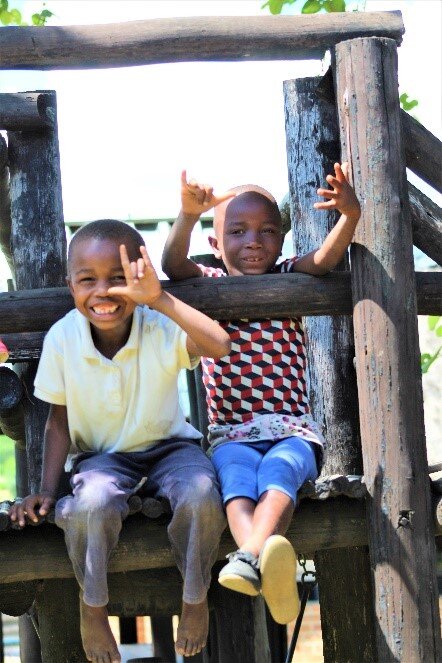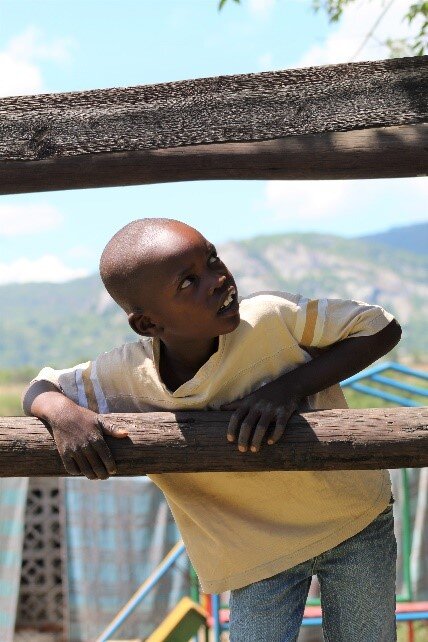Parents and Children Learning Together at Nzeve
When the first school term began, in January 2019, the enrolment for the Early Childhood Education (ECD) deaf children was 19, (10 boys and 9 girls). The enrolment later rose to 23, following the enrolment of four more new children who were identified during the year. Six children graduated in December 2019 and got places at local primary school special classes for 2020, and then eight new children joined in January 2020.
Parent and child activities were planned and conducted daily in two separate groups. The first group of beginners consisted of 4 – 5 year olds. This group was involved in activities that introduced sign language vocabulary and social skills. The group included some 6-7 year olds who were identified late but are still at beginner level. Deaf adult role models and teachers with good sign language skills, helped the mothers to learn to communicate with their children in visual ways. The second group of progressing children, aged 6 – 7 years, were taught more signing vocabulary that included conversational skills, and preschool skills in preparation for formal schooling. Mothers were involved in story telling and teaching about emotions.
The children were also involved in sporting activities, including ball games, running and swimming.
The sporting activities helped children develop gross motor skills. One boy who has difficulty in walking due to a mild cerebral palsy, has shown great improvements in his movement. He has also become much happier and has improved social skills since he started coming to the centre with his mother on a regular basis.
Children were given a simple nutritious meal and snack during the morning. This was appreciated – some of the children reported they had not eaten before coming to school.
Parent involvement in children’s learning activities
Mothers attending the children’s daily activities were involved in working with the children. We have noticed how children’s behaviour improves when parents start to communicate, and they become more secure in their relationships. Mothers become more responsive to their child’s needs and feelings. Early identification and communication in an accessible language for deaf children improves children’s future progress in school.
One mother, who was new, watched the other mothers work with their children and this helped her gain confidence to try herself. Her son is now making progress. Most parents started the year with only a few simple signs to use with their deaf child, but by developing their sign language skills they are now able to communicate much better with their children. Children are always curious and ask questions. Mothers have become more confident to answer the questions in sign language and to try and explain what is happening to their deaf child. It is important for children to be able to label and to understand their feelings. Mothers were encouraged to discuss feelings with their children and have been observed asking their child “Why are you crying?” Children can reply and the parent then helps them to solve the problem.
Weekly parents’ meetings
Through weekly parents’ meetings, new parents expressed their understanding and appreciation for support as they saw the older parents discussing issues of denial, acceptance and guilt. Others shared the experiences of their deaf children and supported the newer ones by sharing ideas on how to raise their deaf children. At the end of year graduation, mothers reported that they valued meeting with other mothers. The mothers also had an opportunity to learn and understand about the deaf community. This assisted them to have hope for the future.
27 mothers of deaf children attended the meetings every week. The skills learnt through the activities in this project have lasting effects on the communication and learning of children and parents. It also affects the relationships and behaviour within families.
Weekend workshops ensure the fathers have an opportunity to come to Nzeve, meet deaf people and learn more about their children and how to communicate with them.
This year Nzeve held four workshops for parents of deaf children at ECD, primary and secondary school levels. In the first three workshops both parents and extended family members were invited, while the fourth workshop was for the fathers of deaf children only. The parents’ workshops provided an opportunity for extended family members to learn about deafness and the importance of their involvement in the education for the deaf. The purpose of the fathers’ workshop was to help fathers of deaf children show their understanding of their roles in shaping the future lives of their children by getting more involved. This was achieved by involving deaf mentors who joined the fathers’ workshop and told their life stories. The fathers indicated that they had been inspired as they promised to support their children in all aspects of life.
One mother reported that the situation at home was better since fathers were involved. Another father wanted to send his deaf child away to boarding school but after the fathers workshop, he was more positive about his child. He came to understand the need to be closer to the child and to try and communicate with him.


